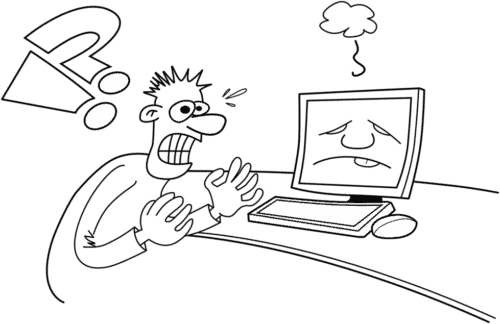
Your computer may slow down for various reasons, but the biggest culprit is one – how you use it. Downloading programs, surfing the web, installing extensions, creating files and filling the system hard drive with music and movies, eventually impacts the PC’s performance. Luckily, this does not mean that your computer is beyond redemption, and much of the damage can be corrected and avoided by employing better electronic habits.
How often are you frustrated when the computer starts acting up, slowing down or freezing? The list below does not cover all possible scenarios, but it should give you a good head start understanding why your personal computer is not performing as expected.
Too Many Browser Add-Ons
Not every browser extension is created to enhance your experience. In most cases, people assume a slow system is caused by a virus; however, many times the culprit is plugins or add-ons bundled in free software. The add-ons are labeled as either search protectors or popup blockers, but the reality is that they are browser adware that downloads and displays ads once you open the browser.
Fix: Browsers offer you the capability to remove or disable the extensions, add-ons and toolbars that do not add value to your surfing experience. Open your browser and find your way to the extensions management module to remove the add-ons.
Running Multiple Programs at Once
Multitasking is the biggest reason why people have computers; however, it will get to a point where your system begins to falter. A PC’s ability to run several programs at once partly depends on its Random Access Memory (RAM) capacity. When the programs running demands outstrip the computer’s memory and processing powers, there is a significant slowdown.
Fix: Shut programs that are hogging the system’s resources and you are not using them. In Macs, Windows 10, 7 and earlier versions, programs can be closed using the file menu module. Windows 8 allows programs to run in the background before they are finally shut down automatically.
You Have a Virus
Malware such as spyware and viruses can significantly slow down your computer’s processing speed. This is because these little programs tend to mess around with all your computer files, including hijacking your browser, intermittently showing pop up advertisements and crashing the system.
Fix: Cyber security Detroit-based experts advise that you download an antivirus program and run a malware scan. However, remember to go to antivirus settings and configure it to carry out automated scans late in the night when you are not using your PC. Frequent background virus scans can also slow down your system.
Hard Drive is 90 Percent Full
Hard drives tend to slow things down when they reach 90 to 95 percent of their storage capacity. The full hard drive prevents the computer from starting up as it should in an effort to optimize the remaining space as much as possible. The biggest hard drive space-hogging culprits include programs, updates of programs and download, as well as temporary and associated files of deleted programs.
Fix: Deep clean your PC of unnecessary files of deleted programs, obsolete downloads and temporary files. Consider moving some of your stuff to the cloud. You can also get back a significant amount of hard drive space by regularly emptying your trash.
Possible Hardware Failure

If your system is still slow after going through the recommendations above, it is possible that it is experiencing a serious hardware related fault like a failing component. This can be a bad or failing RAM, CPU or hard drive. In such a case, it is best and even cost effective to simply replace your computer.
 Gearfuse Technology, Science, Culture & More
Gearfuse Technology, Science, Culture & More


